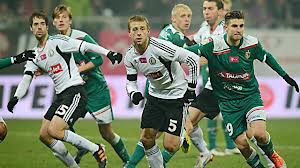By Krzysztof Baranowski
April 10 – Poland’s top professional league, the T-Mobile Ekstraklasa, has radically reformed its structure for the 2013/14 season that is scheduled to kick off July 13 and play through to May 2014. The changes have been prompted by a requirement to make the league more attractive for media partners and sponsors.
Polish football has suffered in the economic downturn across Europe. Depite co-hosting the European Championships in 2012 with Ukraine, the club game has not experienced the expected boost commercially with many of the league’s clubs struggling to pay their players on time. Polonia Warsaw, which had been unable to pay its players for a year, has recently filed for bankruptcy.
The catalyst for the league to bring in a raft of new changes has been the creation of a new media platform, following the merger of n-TV (owned by ITI Neovision) and Canal+ Cyfrowy (owned by Canal+ Group). At the core of the new format will be the addition of more games, giving the broadcaster more competitive league matches to air.
It is anticipated this will also bring greater value to existing league sponosrs as well as attract new sponsors.
The first phase of the new season will see the 16 teams in the league compete in 30 rounds. After these matches, the table will be divided into two groups – “the master” (top 1-8 teams) splitting from the bottom half (teams placed 9-16).
In the second stage of the season, each team will play seven more games. The teams placed 1-4 and 9-12 will play four games at home, three away, while the teams placed 5-8 and 13-16 will play three at home and four away. The higher ranked teams from the regular season will have a greater home advantage for the second phase. The bottom two teams will be relegated.
The previous Polish league experimented with splitting the league in the 2001/2002 season. Then teams were divided into two groups (A and B) from the start of the season. The top four teams in each group went on to compete in the second half of season for the championship, wihile the four weakest teams in each groups were “fighting for a living” (avoiding the relegation places).
Currently the Ekstraklasa is close to a contract extension with its title sponsor – telecommunications company T-Mobile. The new format, increased games and stronger broadcast platform will add value to that sponsorship.
The league has stated a desire to create a dedicated Ekstraklasa TV channel that would broadcast every league match. But to date that ambition remains unfulfilled.
Contact the writer of this story at moc.l1738728508labto1738728508ofdlr1738728508owedi1738728508sni@i1738728508kswon1738728508arab.1738728508fotzs1738728508yzrk1738728508

